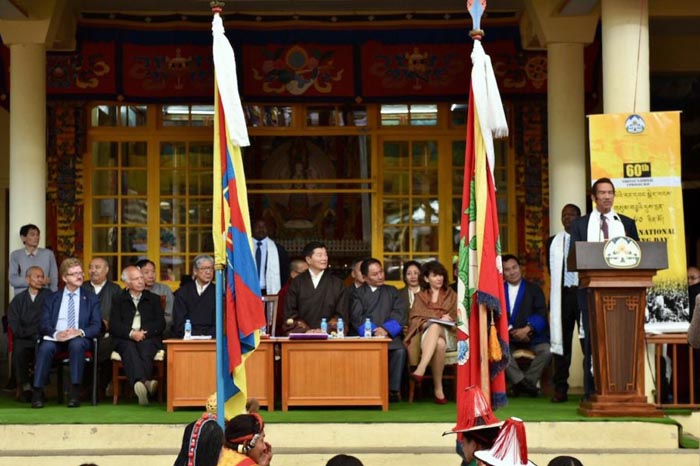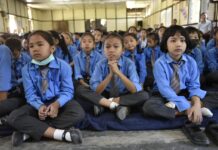
(TibetanReview.net, Mar11’19) – The exile Tibetan administration at Dharamsala, India, had, for the first time, a former long-term head of state as chief guest at its 60th national uprising anniversary event on Mar 10. Serêtsê Khama Ian Khama, who was the President of landlocked south African Republic of Botswana until last year, called the Tibetan commitment to non-violent struggle truly remarkable given the extreme repression they had endured. He lauded the Tibetan people for their collective determination and said it will ensure their ultimate victory.
Joining a guest list that included lawmakers from 10 countries and some 60 Chinese intellectuals from mainland China, Taiwan and other countries – according to the Central Tibetan Administration (CTA) on its Tibet.net website Mar 10 – Khama said, “Our own presence here today is testament to the fact that while the March 10 patriots were physically defeated, the spiritual struggle for a Free Tibet lives on in the hearts and minds not only of Tibetans at home and in exile, but also among growing numbers within the international community.”
He called the Tibetan people’s commitment to continue to base their struggle on the “Middle Way” doctrine of non-violence and dialogue, which is ultimately aimed at reconciliation with the Chinese state, truly remarkable, given the extreme repression Tibetans have endured in both the Maoist and post-Mao eras.
He felt that “while the authorities in Beijing may have the power to suppress basic freedoms within their own jurisdiction they should not be allowed to exercise the same repressive authority outside of their borders including illegal territorial claims in the South China Sea.”
He added that it was for this reason that in 2017 he, as the President of Botswana, refused to give in to Chinese government pressure and threat to invite His Holiness the Dalai Lama to his country. “Unfortunately, notwithstanding our principled stand, in the end, His Holiness the Dalai Lama was unable to attend the gathering, which otherwise attracted esteemed participants from the region and beyond,” he added.
He questioned China’s logic that that the Dalai Lama’s influence could be diminished by seeking to deny others the opportunity of his physical presence, noting that the persistent efforts to block him from ever coming to Africa had only raised his profile across our continent.
And delivering “a message of hope for the people of Tibet”, Khama said, “While your own struggle has been long and painful, you can take solace in the fact that in your hearts you remain undefeated, in your minds you are already liberated. With such a mindset and the power of your collective determination, your own victory is ultimately certain.”
Botsawana’s current government had refused to clear Khama’s visit for the event, expressing fears that it may offend China, with the result that he made it on his own.
Kham, 66, a former military officer, was the President of Botswana from 2008 to 2018 and before that Vice-President from 1998–2008. Botswana, Africa’s oldest continuous democracy, became independent from British rule on Sep 30, 1966 and has since then maintained a tradition of stable representative republic, with a consistent record of uninterrupted democratic elections and the best perceived corruption ranking in Africa since at least 1998.
Apart from the official statement of the Central Tibetan Administration (CTA) read by President Lobsang Sangay and of the exile Tibetan parliament presented by Speaker Pema Jungney, speeches were delivered by a number other guests. They expressed support for the CTA’s middle way policy of seeking autonomy, not independence, through a negotiated settlement with China.
The other guests included Mr Shanta Kumar, former Chief Minister of Himachal Pradesh and a current member of Indian Parliament; Mr Michael Brand, Member of the German Bundestag; Mr Thomas Mann, Member of European Parliament and President of the Tibet Interest Group there; Mr Garnett Genuis, a Conservative Party member of Canadian parliament; Mrs Lucia Duris Nicholsonova, Deputy Chairman of the Slovak parliament’s National Council; Ms Mei Nu Yu, Democratic Progressive Party MP from Taiwan; Ms Sandy Kalyan, Democratic Alliance MP from South Africa; Mr Alberto de Belaunde, Liberal Party MP from Peru; Ms Antonella Incerti and Dr Yang Jianli from the Citizen Power Initiatives for China. Some of the MPs made it to the event in defiance of pressure from China.
Following the official function on the Tsuglakhang courtyard at Mcleod Ganj, the guests had a luncheon with His Holiness the Dalai Lama. Tibetans took out a rally to downtown Dharamsala, carrying Tibetan flags, banners and placards and shouting slogans such as “Long live Dalai Lama,” “Tibet belongs to Tibetans,” “Tibet’s freedom is India’s security” and “India-China friendship is a sham”, many with their faces painted in Tibetan flag.
* * *
Activists of the Tibetan Youth Congress (TYC) carried out a peace march from Delhi’s Ramlila Maidan to Jantar Mantar to mark the 60th Tibetan uprising day, the first of the group’s planned three-day protests. The activists raised slogans such as “Let His Holiness the Dalai Lama return to Tibet” and “Freedom and justice for Tibet”, reported the ANI news agency Mar 10.
“60 years ago in 1959, we lost our country to Chinese. We are here to mark this day and to remember all those who lost their lives. We have also taken a pledge that we will continue to fight for the freedom of Tibet. Protesters have come here from all across India and we will keep fighting until issue of Tibet gets resolved,” TYC president Mr Tenzing Jigme was quoted as saying.
The at least 3,000 Tibetan marchers, invoking India’s concerns over China’s expansive power in Asia and beyond, also shouted slogans including “Tibet’s freedom is India’s security” and “India-China friendship is a sham,” reported the AP Mar 10.
* * *
Town halls in nearly 750 Czech municipalities flew the Tibetan flag to mark the 60th anniversary of Tibet’s uprising against Chinese occupation, reported radio.cz/en Mar 10. The report said protests were also scheduled outside the embassy of the Communist country on Mar 10 afternoon.
The report noted that since the end of communism in 1989, many Czechs had marked the Tibetan Mar 10 anniversary in a show of support for Tibetan independence.
“In 1996, when the “Flag for Tibet” initiative first started here, four Czech city and town halls flew Tibet’s flag,” the report said.
* * *
In Taiwan’s capital Taipei, members from more than 20 Taiwanese organizations took part in a marched with Tibetans in the rain on Mar 10. They included representatives from the Democratic Progressive Party (DPP), the Green Party-Social Democratic Party Alliance and the Free Taiwan Party, reported taipeitimes.com Mar 11.
The report said the march, carried out by several hundred people, started at the 228 Memorial Park and ended at the Nishi Honganji Relics, a reconstructed Buddhist temple complex in the Ximending area, with participants shouting slogans such as “Tibet belongs to Tibetans,” “Chinese military get out of Tibet” and “We want to return to our homeland”.
Addressing the gathering, DPP Secretary-General Luo Wen-jia has criticized the leaders of the opposition KMT for urging Taiwan to negotiate with Beijing and sign a peace agreement, saying that the result of the 1951 17-Point Agreement was Beijing’s annexation of Tibet.
New Power Party (NPP) Legislator Freddy Lim helped to launch a petition to invite the Dalai Lama to visit Taiwan this year, and urged civic organizations, religious groups and the public to help make it happen.
“A visit from the Dalai Lama would only focus on religion, as he is the spiritual leader of the Tibetan people and the followers of Tibetan Buddhism. He would be coming to promote religious teaching and to interact with other faiths in Taiwan,” another taipeitimes.com report Mar 11 quoted Lim as saying. “Therefore the petition is based on efforts by ordinary people, non-governmental organizations and religious groups, and is not led by our party.”
* * *
In New South Wales, Australia, members of the Cardiff and South Wales Tibet Support Group gathered outside Newport Crown Court to condemn rights violations in Tibet. The group waved Tibetan flags and distributed leaflets in a bid to highlight their concerns, reported southwalesargus.co.uk Mar 10.
“People need to speak out and support the Tibetan people. There is a great deal of oppression happening in Tibet. It should not be allowed,” Pippa Bartolotti, of the Wales Green Party, was quoted as saying.
Another group member, Pamela Manfield has said, “Tibetans are persecuted and are not free. Basic human rights are violated. That cannot be allowed in the 21st century.”
* * *
China’s official Xinhua news agency published an editorial on Mar 9, claiming, “sixty years since the epoch-making democratic reform in Tibet, people… have enjoyed unprecedented human rights in history.” It referred to the presumable cruelty of the system in Tibet in which “more than 90 percent of the population” were victims before the Chinese annexation of the territory.
The editorial claimed: “Nowadays, with political and other rights fully guaranteed by the regional ethnic autonomy and the socialist system, Tibetan people enjoy far better human rights than they did in the old days. Tibet is in its best period of development; its human rights situation has never been in better shape.”
But as noted by the AP report of Mar 10, “Conditions in the region are difficult to independently ascertain because foreign travelers must get special permission to enter the region. Access is rarely given to foreign journalists, and the region is closed to foreigners entirely during sensitive anniversaries.”
* * *
Citing cases of torture and forced political indoctrination, a coalition of dozens of overseas Tibet monitoring groups said the issue of human rights in Tibet “remains an issue that cannot be consigned to history”.
“China has ridden roughshod over the human and political rights of citizens under its rule for far too long,” said the International Tibet Network in a letter emailed to media. “With resistance by the Tibetan people so strong and vibrant, it’s time for a response from the international community that matches their courage and conviction.”





